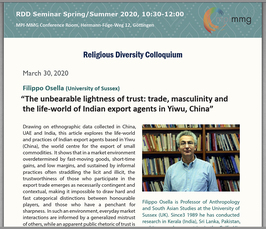CANCELLED - "The unbearable lightness of trust: trade, masculinity and the life-world of Indian export agents in Yiwu, China"
Religious Diversity Colloquium Spring/Summer 2020
- Datum: 30.03.2020
- Uhrzeit: 10:30 - 12:00
- Vortragender: Filippo Osella (University of Sussex)
- FILIPPO OSELLA is Professor of Anthropology and South Asian Studies at the University of Sussex (UK). Since3 1989 he has conducted research in Kerala (India), Sri Lanka, Pakistan, and in a number countries in the Gulf. His recent books include Islam, Politics and Anthropology (with B. Soares, 2010), Islamic Reforms in South Asia (with C. Osella, 2012), Religion and the Morality of the Market (with D. Rudnyckyj, 2017). Last year he has co-edited (with S. Ramaswamy) a special issue of Modern Asian Studies on “Charity and Philanthropy in South Asia” (2018). His current research focuses on trading networks between China, India and West Asia, and he has recently begun research on a two years, ESRC-funded project on artisanal fishers’ attitudes towards risk in Kerala (India).
- Ort: MPI-MMG, Hermann-Föge-Weg 12, Göttingen
- Raum: Conference Room

For more details please contact vdvoffice(at)mmg.mpg.de.
Drawing on ethnographic data collected in China, UAE and India, this article explores the life-world and practices of Indian export agents based in Yiwu (China), the world centre for the export of small commodities. It shows that in a market environment overdetermined by fast-moving goods, short-time gains, and low margins, and sustained by informal practices often straddling the licit and illicit, the trustworthiness of those who participate in the export trade emerges as necessarily contingent and contextual, making it impossible to draw hard and fast categorical distinctions between honourable players, and those who have a penchant for sharpness. In such an environment, everyday market interactions are informed by a generalized mistrust of others, while an apparent public rhetoric of trust is built on the careful concealment and deployment of its absence. That is, the nature of export trade from Yiwu is such as to require the careful management of mistrust and suspicion within a rhetoric or aesthetic of mutual trust and amity. The article suggests that the apparent tension between everyday practices of mistrust and a rhetoric of trust is neither resolved nor erased, but mediated through the performance of multiple registers or modalities of masculine assertion and competence. Indeed, what oils the wheels of the export trade in and from Yiwu is not trust but politics and hierarchies of gender, played out by export agents and their clients on the stage of hospitality and commensality.
❂ Religious Diversity Colloquium Spring/Summer 2020